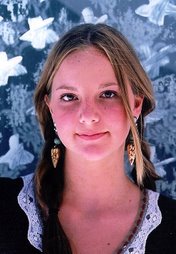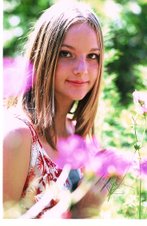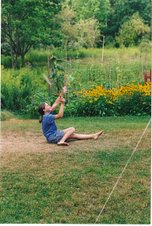English 199
Gorra
First Response “What kind of reader are you?”
Elizabeth Aakre
9.12.06
I can’t remember being taught to read, and, because my parents can’t either, I’ve come to assume that I was simply born knowing how. Or at least that’s how I feel; like reading has and always will be a natural part of my life.
When I was really young I read as much as I could, competing with other girls in my class to see how many books we could read in a week. It was about quantity, not understanding, but also about being proud of having a skill: I could read quickly. I loved to read all day, sometimes finishing two or three books and see them stacked by my bed at night, knowing that I had gotten through so much. I would read anything, but particularly liked fantasy, the tomboys who trained dragons or wanted to become knights. I could get caught up in those golden worlds easily, daydreaming only of cutting my hair short and running away and being fierce and mean.
I started reading more for understanding, and the love of that musty smell, when I was 12 or so. Suddenly I couldn’t read so quickly anymore. What was wrong with me? Why didn’t I understand what the first 30 pages of James Joyce’s Ulysses meant? Couldn’t I read anything I want? I was humbled and embarrassed, but kept reading at a pretty steady pace – enjoying learning new words and practicing them on boys I had crushes on. “Do you even know what psychedelic means?” I would taunt, not understanding fully either.
I don’t remember the first ‘adult’ book I read, but there was no turning back. I decided that before I turned 20 I was going to read all of the classics. Little did I know that everyone has a different list of what the classics are, and what a lofty goal that was. I still read every day, or try to, but not nearly as quickly as I used to. I’d like to attribute this mostly to reading more closely, but I know some of the slowness has to do with being more distractible than I used to be.
My favorite books now have some of the same traits that those fantasies had; long sweeping plots, endless connections and possibilities, and of course, a heroin. One of my favorite heroines is the main character in Shirley Jackson’s We Have Always Lived in the Castle. I first read the book when I was 14. I felt like I was seven again. I tore through it in a couple of hours and then read it again the next day. The book affected me in emotional way that was quite childlike, an almost awe. Instantly I had a new genre of books that I had to read all of: mystical, suspense driven psychologically emotional books.
Though the name of the genre I love is ugly and rambling, some of the authors within it are the most concise and bright in the world. Henry James and Iris Murdoch, William Faulkner and Flannery O’Connor. These are the authors I’ve been trying to speed through over the years. But the things is, I can’t bring myself to miss a word in their sentences, just to finish their book faster. I couldn’t miss Faulkner’s only punctuation mark in the chapter due to haste, I couldn’t! So I have slowed down my pace and widened my horizons and have turned into a reading addict.
Subscribe to:
Post Comments (Atom)
How Dina Aunty relished her memories. Mummy and Daddy were the same, talking about their yesterdays and smiling in that sad-happy way while selecting each picture, each frame from the past, examining it lovingly before it vanished again in the mist. But nobody ever forgot anything, not really, though sometimes they pretended, when it suited them. Memories were permanent. Sorrowful ones remained sad even with the passing of time, yet happy ones could never be re-created—not with the same joy. Remembering bred its own peculiar sorrow. It seemed so unfair: that time should render both sadness and happiness into a source of pain.
> From A Fine Balance by Rohinton Mistry
> From A Fine Balance by Rohinton Mistry














This comment has been removed by a blog administrator.
ReplyDelete